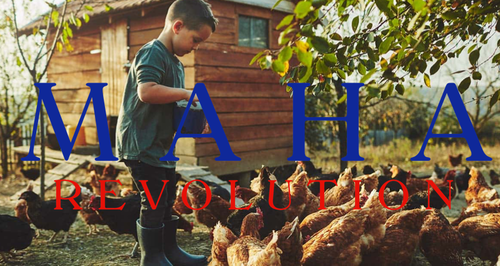The MAHA Report, released last week, focuses on deliverables that actually fall within the executive's constitutionally limited scope of authority. Where some have argued that increased federal authority is justified to "Make America Healthy Again," the report outlines the ease of corporate capture when control becomes centralized.
Instead, the administration is going all-in on partnering with America's farmers and ranchers. "We Can Not Succeed in This Movement Without the Partnership of the American Farmer, "said RFK Jr during the MAHA Report presser.
With consensus being rare within the agricultural industry, ZeroHedge set about finding what a farmer-focused partnership might look like to MAHA Ag leaders. Surprisingly, we found consensus on key issues ranging from regulatory reform to mission realignment and consumer choice.
Judith McGeary, the Executive Director of the Farm and Ranch Freedom Alliance (FARFA), tells ZeroHedge that a partnership with America's farmers looks like regulatory reforms first.
"We need an overhaul of government programs -- not simply eliminating regulations, but a careful re-crafting of them -- to develop scale-appropriate regulation that fosters fair and open competition in the marketplace for consumers to have real choices and access to healthy food."
McGeary further explains that current regulations, crafted by monopolies, prevent small producers from marketplace access.
"Regulations in almost every area of food -- including meat processing, egg grading, and produce safety -- are designed to be workable for large-scale, chemical and confinement-based producers. And even when small, regenerative producers find a way to manage to comply with the regulations, they are largely either kept out of the markets due to corporate control or undercut by misleading labels and marketing."
Bill Bullard, the CEO of R-CALF USA, shares McGeary's call for regulatory reform.
"We appreciate that this report identifies key problems within our beef supply chain that our government has refused to address, until now," Bullard said. "These problems include undue corporate influence over national dietary guidelines; a revolving door between government regulators and regulated corporations; and the corporatization and consolidation of our cattle and beef market."
Bullard adds that partnering with America's farmers must include the USDA's original mission of antitrust enforcement and restored consumer confidence with a return to Mandatory Country of Origin Labeling (MCOOL) requirements.
"Partnering with us will include an emphasis on antitrust and Packers and Stockyards Act enforcement to curb corporatization and consolidation; an end to the demonization of beef and recognition of its critically important dietary role; reinstatement of MCOOL, as where beef is produced and under whose production standards it was produced is important to ensure safety and wholesomeness," Bullard said, adding that he's hopeful Congress can make headway in the next Farm Bill.
Bullard appeared on Fox Business last week, warning about the ongoing hollowing out of rural communities across America.
For Tennessee rancher and Agricultural attorney, Dustin Kittle, the corporate capture of the Farm Credit Administration (FCA) has hit too close to home. Kittle, who has dedicated his career to saving the family farm, tells ZeroHedge a partnership must include the mission realignment of the FCA.
"The Farm Credit System was originally created to safeguard family farms. It's now funneling half of its $400 billion loan portfolio into mega-loans ($25 million and higher) to the usual suspects of Big Ag," Kittle explains. "In fact, there are Fortune 500 companies who have taken out billion dollar loans, at reduced interest rates, through the U.S. Farm Credit System."
Kittle continues by outlining the impacts.
"If we eliminate the Big Ag mega-loans draining Farm Credit's funding dry, it frees up $200 billion in lending capital; enough capital to provide a $400,000 farm loan to 500,000 family farms; near identical to the same number of farms the USDA found to be in need of financing in a 2023 Report issued by its Economic Research Service."
Cole Bolton, rancher and Senior Vice President of Frontier Bank of Texas, spends his time trying to educate ranchers on proper leverage, debt reduction discipline and how to build a balance sheet to even qualify for lending.
Bolton tells ZeroHedge that regulatory reforms are needed more than ever.
"Now, more than ever, producers need access to liquidity for expansion or just simple stability," Bolton said. "For too long ranchers have been indentured to leverage and the banking regulatory guidelines are making it harder for them to qualify for operating loans."
According to the report Kittle referenced, the United States is losing farms at an alarming rate. Over the last five years, 141,733 farms have disappeared. That's an average of approximately 28,347 farms per year—about 77 farms per hour.
Given that small family farms make up 96-98% of all American farms, it's easy to understand how an industry - that rarely agreed on anything - has been able to find consensus on what partnership looks like.
Time is of the essence. This is why ZeroHedge has launched the first farmer-focused partnership with the Beef Initiative—a rancher-direct think tank. Together, we are committed to leading by example and creating innovative solutions to inject liquidity directly back into the hands that produce our food supply.
As monopoly-guided regulations disproportionately burden small players, and public funds are prioritized for mega-donor reciprocity, we must look to consumer choice and free markets over bigger government.
Simultaneously, MAHA farmers welcome the opportunity to partner and stand united in calls for regulatory reforms and the mission realignment of executive agencies.
